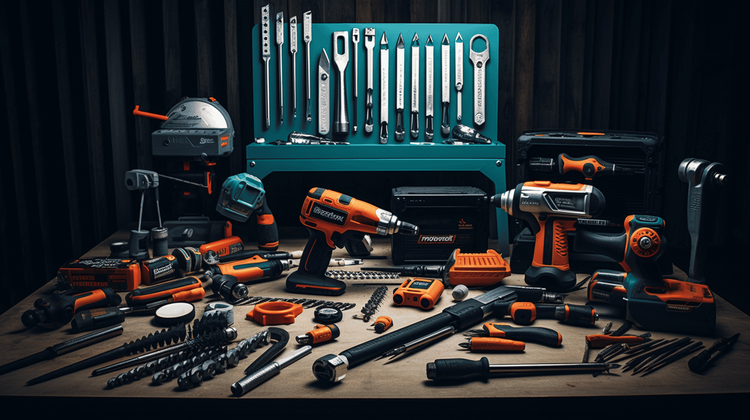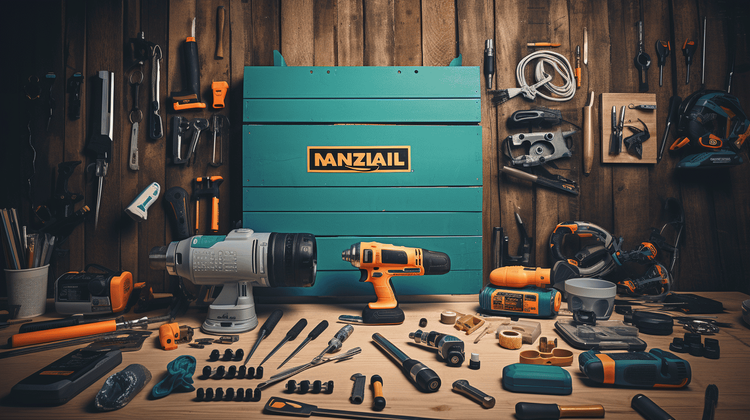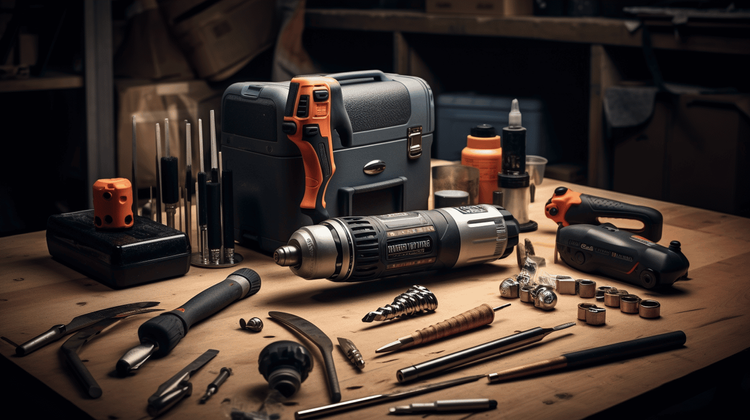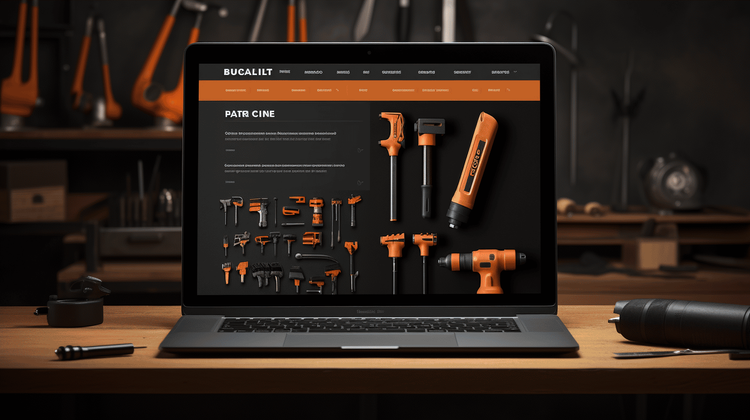Budget-Friendly Tools for DIY Projects: Expert-Recommended Recommendations
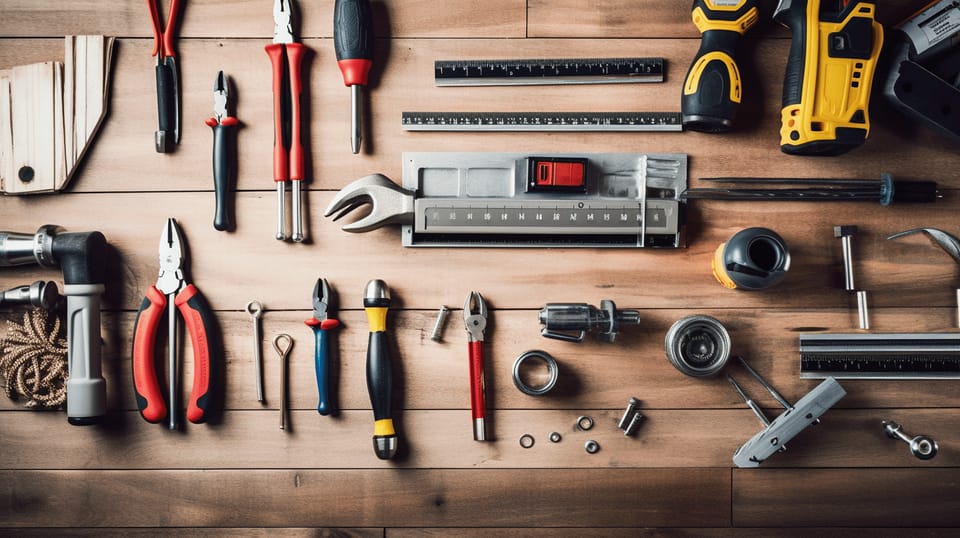
Starting a do-it-yourself project can be both exciting and daunting. The thrill of creating something with your own hands is unparalleled. But without the right tools, the journey from inspiration to completion can feel more like a rollercoaster ride. Fear not, my fellow DIY enthusiasts! We have gathered a comprehensive list of essential and budget-friendly tools to make your DIY projects smoother, easier, and more enjoyable. 🎨🔨📐 So, whether you're planning to craft a simple bookshelf or give your room a makeover, we've got you covered. Aspiring carpenters, budding painters, and everyone in between, let's dive into the world of DIY together!
Essential Tools for DIY Projects
Whether you're channeling your inner builder or fixing broken stuff around the house, delving into do-it-yourself (DIY) projects can be a fascinating journey. And what better way to embark on it than with the right toolkit? Sure, a willing spirit and creativity are vital. But without the necessary tools, even the simplest projects may seem daunting. Here's a list of essential DIY tools to get you started. And remember, your tool inventory is a personal reflection of your DIY journey - as you grow, so should your toolkit.
Measuring Tools
They say, "Measure twice, cut once." This wise old saying highlights the importance of precise measurements in DIY projects. You'll need these tools to help you get accurate measurements:
- A tape measure for getting lengths and widths right.
- A spirit level to ensure your shelves aren't wonky.
- A square for precise corners and edges.
- A caliper for more nuanced measurements.
Remember, imprecise measurements can throw your whole project off. So, don't hesitate to invest in good-quality measuring tools. They might just be your most valuable allies on your DIY journey.
Cutting Tools
Once the groundwork of precise measurements is laid, it's time to cut. Here's what you'll need:
- A hacksaw for cutting metal.
- A coping saw for intricate curves.
- A utility knife for cutting sheet materials.
- A jigsaw for tough yet precise cutting tasks.
Remember, when it comes to cutting tools, sharpness and grip matter most. So, choose wisely and handle with care.
Fastening Tools
Fastening is what brings your project together (literally!). Here are some tools you'll need:
- A drill for making holes, fastening screws.
- A hammer for nails.
- A screwdriver set for various types and sizes of screws.
Investing in power tools, like an electric drill or a cordless screwdriver, can make the job easier and more efficient. But remember, with great power comes great responsibility. Use them with caution.
Finishing Tools
It's not just about getting the job done; it's also about giving it a perfect finish. So, you'll need:
- Sandpaper for a smooth, flawless finish.
- Painting equipment – brush, roller, paint tray, for that final vibrant touch.
- A silicone gun for sealing and waterproofing your project.
With these, you get to add a personal stamp to your work, reflecting your taste and style.
Safety Tools
Last but certainly not the least, safety is paramount when handling DIY projects. Keep these tools handy:
- Safety glasses to protect your eyes.
- Earplugs to protect your hearing in noisy tasks.
- Gloves to keep your hands safe.
- A first aid kit, because accidents can happen, however careful you are.
With these essential tools in your kit, plunge fearlessly into the exciting world of DIY. Just remember the golden rule - your goal is to create, not injure. Happy DIY-ing!
Remember, the key to success in any DIY project is preparation. Choosing the right tools and using them correctly goes a long way in ensuring your project is a success. Now you're equipped with the knowledge, start building your toolkit, and let your DIY journey begin!
Top Budget-Friendly Measuring Tools
Every quality-oriented DIY aficionado, contractor, or homebuilder understands the importance of accurate measurements. It's a well-known adage- "measure twice, cut once," but what about the tools used for those crucial measurements? High-end devices might deliver precision, but they aren't always budget-friendly. So, let's dive into some affordable measuring tools that promise accuracy without breaking the bank.
Tape Measure
Let's start with the basics- the tape measure. It's as much of a household staple as the kitchen sink, beloved for its sheer simplicity and ease of use.
- Pros:
- The flexibility and portability allow measurements in a variety of environments - from flat surfaces and straight lines to curved and irregular shapes.
- Compact size facilitates easy storage and transport.
- Broad range of lengths available, typically from 3 to 30 feet.
- Cons:
- Less accurate for more extended lengths.
- Prone to breakage with heavy use.
In essence, the tape measure is a great entry point for anyone seeking a budget-friendly, versatile tool, perfect for quick measurements around the house or on a job site.
Laser Measure
Next up, we have the laser measure, a tech-savvy step up from the traditional tape measure.
- Pros:
- Delivers high precision, even over extended distances.
- The digital display provides easy-to-read measurements and reduces the chance of human error.
- Most models come with a variety of features such as area and volume calculations, indirect measuring for inaccessible areas, and memory functions.
- Cons:
- Requires batteries, which entails an ongoing cost.
- Might demand a learning curve for non-tech-savvy individuals.
The laser measure is a budget-friendly pick when you want to balance cost, precision, and tech capabilities. You may need to adjust to the digital nature, but once you get the hang of it, there's no looking back.
Calliper
Last, let's look at the calliper, a wonderful tool when it comes to measuring smaller objects with optimum accuracy.
- Pros:
- Can measure internal and external dimensions and even depths with extreme precision.
- Direct readout design saves time, reduces errors.
- Cons:
- Limited to smaller objects.
- Dial callipers might require manual calibration.
Dial callipers are ideal for those frequenting machine shops or dealing with smaller, detailed projects.
Over and above these, there are other measuring tools such as rulers, squares, and protractors that can be quite cost-effective. But remember, as you explore these options, your choice should hinge on your exact needs, personal comfort, accuracy requirements, and of course, your wallet's limits. With a perfect balance, you can procure a tool that becomes a long-standing ally for measurements without breaking the bank!
Affordable Cutting Tools for DIY Projects
Discover some of the most budget-friendly cutting tools that can bring your DIY projects to life. Whether it's crafting wood furniture, assembling a model airplane, or fashioning a custom jewelry piece, the right cutting tools can make the process smoother and the result more professional.
Let's dive in and explore these affordable but effective tools that every DIY enthusiast should consider:
- Utility Knife:This handy tool is a must-have for its versatility. It's ideal for cutting cardboard, plastic, and even thin sheets of wood.
- Hacksaw:The hacksaw, with its fine-toothed blade, is perfect for metal and plastic. Craft intricate shapes and clean cuts effortlessly.
- Chisels:Chisels are great for carving detailed designs into wood. They come in various sizes for different levels of intricacy.
- Coping Saw:The thin metal blade of a coping saw is tailor-made for intricate, curved cuts in wood.
- Tin Snips:If you need to cut through metal sheets, tin snips could be your way to go. They deliver straight and curved cuts with precision.
Remember, safety first. Always use protective gear and follow the tool's instruction manual. "A safe DIY-er is a successful DIY-er," says renowned craftsperson Jenny B.
Budget doesn't have to limit your creativity or the quality of your DIY projects. All you need is the right set of tools, and you're good to go. Affordable doesn't necessarily mean low-quality, and these tools certainly prove it.
Find joy in bringing your creative visions to life with these budget-friendly cutting tools! And remember, the only thing limiting your DIY projects is your imagination!
Cost-Effective Fastening Tools
Fastening tools are the unsung heroes of any toolbox. In pockets, drawers, and toolboxes across the world, these everyday essentials make our lives easier and more efficient. Whether you're a DIY enthusiast or a professional tradesperson, having the right fastening tool at hand is crucial. But who says durable and high-quality fastening tools have to break the bank? Absolutely not us.
There are a plethora of cost-effective options out there for every tool maniac who doesn't want to sacrifice quality for the sake of their wallet. Here, we'll take a sneak peek at some of the best budget-friendly fastening tools that refuse to compromise on performance.
- Budget Screwdrivers:
It's safe to say that screwdrivers need no introduction. Still, did you ever wonder you could find one that’s durable, reliable, and under budget too? Coming in different shapes and sizes with various head types, inexpensive screwdrivers are ideal for a multitude of tasks. For instance, Phillips and flathead are two of the most common types that should not be omitted from a basic toolkit. - Affordable Rivet Guns:
A little more specialised yet entirely indispensable for some tasks. A rivet gun is a must-have for everyone dealing with both metal and plastic materials. There are models out there that deliver high-level performance and longevity, while still keeping an eye on your spending habits. - Economical Wrench Sets:
An essential part of any toolkit, wrenches come in various types one must have, such as open-ended, box-ended, and combination. The market offers excellent economical wrench sets that don't skimp on quality or functionality. - Inexpensive Power Drills:
No toolbox is complete without a power drill. Many brands derive their power drills on a budget without compromising on versatility, power, or durability.
As Pablo Picasso once stated, "The right tool is an integral part of workmanship." But this certainly doesn't mean you have to splurge needlessly. By carefully researching, comparing prices, reading reviews, and most importantly, understanding your specific needs, you can find top-notch fastening tools on a budget. It's about knowing where to look and what to look for, and our tool guide provides the know-how.
Remember, a cost-savvy purchase today can ensure satisfying results and a lighter wallet for tomorrow. So, let's tighten up our belts and dive into the world of cost-effective fastening tools—a world that expertly merges utility with economy. Now isn't that a refreshing change of pace from our usual "must spend more for quality" mindset? 💡
In short, owning reliable fastening tools doesn’t have to come with a hefty price tag. You deserve to have a premium toolkit experience without stepping outside your budget. So why wait? Embrace the era of cost-effective fastening tools, because quality, durability and affordability should never be mutually exclusive. 🛠️🔩
Budget-Friendly Finishing Tools
Does the thought of budget constraints often put a damper on your creative instincts? Fear not, because the world of carpentry and woodworking is teeming with an abundance of budget-friendly finishing tools. In this section, we'll introduce our favorite wallet-friendly alternatives that are perfect for hobbyists, DIY enthusiasts, and professional craftsmen alike.
The key areas we'll focus on include:
- Essential features to look out for
- Our top picks under $100
- Some bonus tricks to make the most out of budget tools
Essential features to look out for
Begin your search by understanding the features that make a worthy finishing tool. Regardless of your budget, always check for the following:
- Quality of Construction: The longevity of your tool heavily depends on its build. Look for durable materials like hardened steel or aluminium.
- Easy Usage: Easy-to-understand controls and ergonomic designs enhance usability and reduce the risk of injuries.
- Efficient Performance: Look for tools that are powerful and versatile enough to handle all the tasks you need them for.
Top Picks under $100
Without further ado, let's explore some of our top finishing tool picks that deliver a serious bang for your buck.
- The Black & Decker Mouse Detail Sander: This compact miracle worker is perfect for detailed finishes and fits snugly into tighter spots than other models. It’s an ideal blend of affordable pricing and satisfying performance.
- SKIL 6 Amp Corded Jig Saw: With a custom molded tool rest, this easy-to-control saw is excellent for both professionals and DIY adventurists.
These are just a couple of examples; there are numerous other budget-friendly options available in the market today.
Bonus Tips for Maximizing Efficiency
Regardless of the price tag, with proper care and use, any tool can work wonders. Here are a few bonus tips to make the most out of your budget tools:
- Regularly clean and maintain your tools. A well-serviced tool not only performs better but also lasts longer.
- Learn to use each tool effectively. Understanding each tool's unique capabilities can significantly extend its scope and utility.
Remember, creativity doesn't ask for a heavy wallet. With a bit of patience and cleverness, one can produce extraordinary results with affordable tools. With these insights, you'll be ready to make the most out of every dollar you spend on your toolkit.
Safety Tools on a Budget
Everyone wants to keep their place safe and secure, but sometimes safety tools may seem like a daunting investment. Good news! This article will show you that you can build a great safety kit without breaking the bank.
First and foremost, knowledge is the best tool in any homeowner's arsenal. That's why it's essential to stay updated with the latest safety norms and protocols. In fact, a common myth about safety tools is that they have to be expensive to be effective. In reality, the effectiveness of a tool is not determined by its price tag, but by its ability to perform its intended function correctly.
Let’s take a look at some affordable yet effective safety tools:
- Fire Extinguishers: These are a must-have in every home. There are many affordable options available that are easy to use and capable of handling most small home fires.
- Smoke Alarms and Carbon Monoxide Detectors: While slightly pricier, these detectors are nevertheless essential. They provide early warning of potential hazards, giving you time to react.
- First Aid Kits: An all-purpose first aid kit can be a lifesaver in an emergency and doesn't have to cost much.
Apart from buying these tools, their maintenance is equally essential. For instance, check "expiry dates" on fire extinguishers and replace batteries in smoke alarms periodically.
Then, there's the DIY approach. Sometimes, the best safety tool is the one you build yourself. This doesn't mean necessarily constructing complicated gadgets, but simple items like a slip-proof rug or a well-placed night light can significantly reduce the odds of an accident happening in your home.
"Safety is something that happens between your ears, not something you hold in your hands." - Jeff Cooper.
So remember, the price of your safety tools isn't a reflection of their efficacy. All it takes is a little bit of knowledge, regular maintenance, and a keen eye for danger to create a safe sanctuary on a budget. After all, when it comes to safety, peace of mind is priceless!
Additional Tips for Budget-Friendly DIY Projects
Engaging in fun do-it-yourself (DIY) projects at home can not only bolster your creative prowess but also help you save those extra bucks. If you're a DIY enthusiast looking to sprinkle some budget-friendliness into your exciting projects, you've definitely landed on the right page. In this section, we'll unveil some additional clever hacks to accomplish your DIY projects on a budget, without compromising on quality or excitement. Let's dive right in, shall we? 🚀
Initially, it's essential to keep in mind the golden rule, "Planning Prevents Poor Performance". Lack of a proper plan may endanger your project, potentially leading to unnecessary expenses.
Create A Detailed Plan
Planning ahead allows you to pen down exactly what you need. This reduces the chances of unwanted expenditures, making you spend your money where it's genuinely needed.
Next, look out for used or recycled materials. It's not just budget-friendly—it's eco-friendly too!
Look for Used or Recycled Materials
Used goods and recycled materials can be incredible resources for DIY projects. Companies like FreeCycle are doing an amazing job at connecting people who have items to give away, potentially reducing waste.
That's not all! We also have “upcycling” as a fantastic route to budget-friendly DIY projects.
Upcycle Old Items
Upcycling is a creative process where you give your old items a new life and purpose. It helps you save money, keep memories intact, and reduce potential waste.
Remember, going overboard with buying tools could also be detrimental to the budget. Here's how you can address this:
Borrow or Rent Tools
Instead of buying new ones, you could borrow or rent tools from friends, family, or even renting platforms. This definitely goes a long way in maintaining a budget-friendly approach to your DIY project.
"Everything that shines ain't always gonna be gold," said Kid Cudi. He was right, even in the context of DIY. It's good to set realistic expectations. Let's get into that:
Set Realistic Expectations
Ensure your project goals are achievable within your set budget. Sometimes, detaching from that Pinterest-perfect image can save you a lot of money and disappointment.
Lastly, don't forget to have fun! 😄 You're not just making a project, you're creating memories. Keep the process enjoyable without stressing too much about the end result.
So, there you have it! These additional budget-friendly DIY tips are sure to help you navigate through your next project with ease and affordability. Let's get crafting! 🛠️
Conclusion
There you have it, a comprehensive guide to budget-friendly tools for your DIY projects. Investing in the right tools can make a world of difference in the quality of your work and the enjoyment you get from doing it yourself. Remember, though, that as important as the tools are, so is operating safely and smartly, which makes your DIY projects even more fun and fulfilling.
Indeed, not only will the right tools from reputable stores like the Ultra Handy Amazon Store make your projects easier, but they'll also assist in achieving that professional finish. You'll find it rewarding to see what you can build with your own hands, all the while knowing you didn't spend a fortune to do so. Let your DIY journey begin!
Frequently Asked Questions
- What are some budget-friendly tools for DIY projects?Some budget-friendly tools for DIY projects include: 1. Hammer, 2. Screwdriver set, 3. Tape measure, 4. Utility knife, and 5. Pliers.
- Are budget tools of good quality for DIY projects?Yes, budget tools can still be of good quality for DIY projects. While they may not have all the advanced features and durability of expensive tools, they can serve well for occasional or light use.
- Where can I find these budget-friendly tools?You can find budget-friendly tools for DIY projects at various places such as hardware stores, home improvement centers, online marketplaces like Amazon, or even at garage sales.
- Should I invest in power tools for DIY projects?Investing in power tools for DIY projects can be beneficial as they provide efficiency and precision. However, if you have a limited budget or only plan to do basic tasks, manual tools can still get the job done.
- What factors should I consider when buying budget tools for DIY projects?When buying budget tools for DIY projects, consider factors such as the intended use, durability, user reviews, and the warranty offered. It's essential to strike a balance between affordability and quality.
